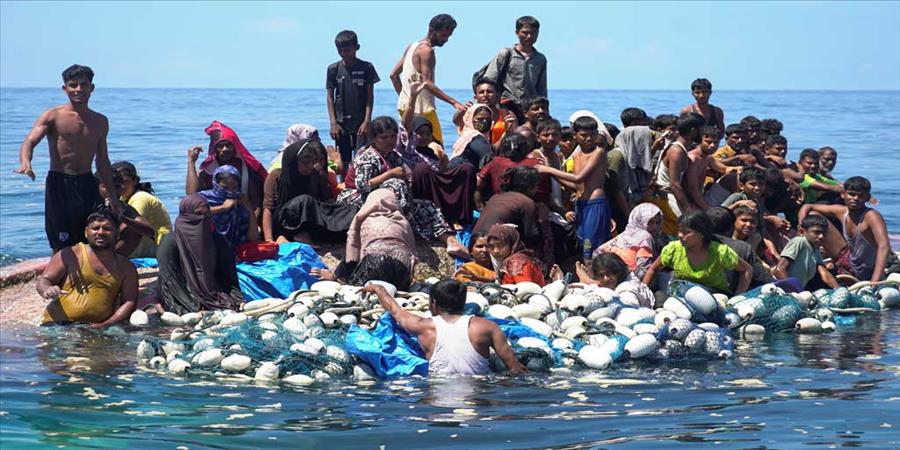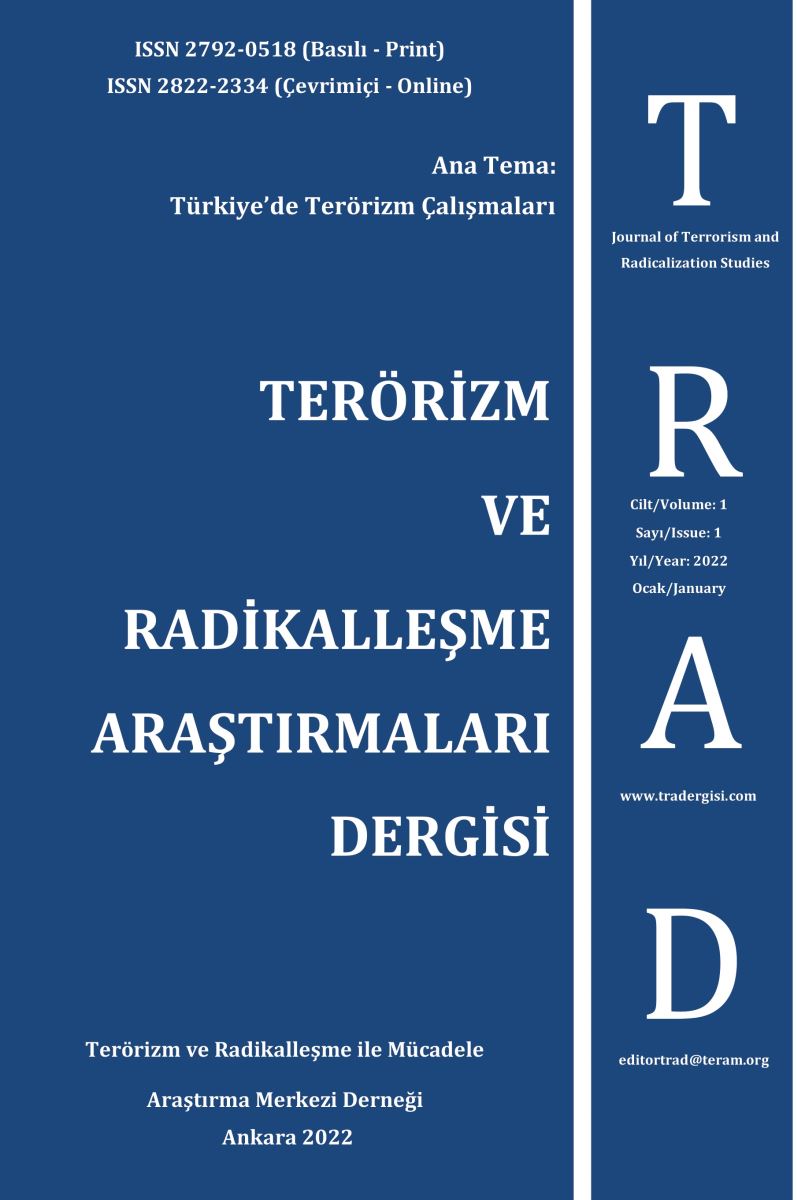
Radikalleşme ve Radikalleşme ile Mücadele Alanında Literatür Taraması
Alanda akademik çalışmalar yapanlar için faydalı olabileceğini düşünerek, 2020 yılı içerisinde radikalleşme ve radikalleşme ile mücadele alanında yayımlanan akademik yayınların listesini hazırladık. Bu yayınlar makaleler ve kitaplar şeklinde ayrı ayrı listelenmiştir. Faydalı olması dileğiyle iyi çalışmalar dileriz…
Hazırlayan: Tuğçe ŞİMŞEK
Makaleler
Ocak 2020
- Agastia, I. G. B. D., Perwita, A. A. B., & Subedi, D. B. (2020). Countering violent extremism through state-society partnerships: a case study of de-radicalisation programmes in Indonesia. Journal of Policing, Intelligence and Counter Terrorism, 1–21. doi:10.1080/18335330.2020.1722317
- Al-Khoury, D. (2020). Radicalisation: old and new a comparative analysis of the Red Brigades and the Islamic State. Quality & Quantity, 1-19. doi:10.1007/s11135-020-00963-1
- Eleftheriadou, M. (2020). Fight after flight? An exploration of the radicalization potential among refugees in greece. Small Wars & Insurgencies, 31(1), 34-60. doi: 10.1080/09592318.2020.1672960
- Figoureux, M., & Van Gorp, B. (2020). The framing of radicalisation in the Belgian societal debate: a contagious threat or youthful naivety?. Critical Studies on Terrorism, 13(2), 1-21. doi:10.1080/17539153.2020.1714415
- Pelletier, P., & Drozda-Senkowska, E. (2020). Virtual reality as a tool for deradicalizing the terrorist mind: Conceptual and methodological insights from intergroup conflict resolution and perspective-taking research. Peace and Conflict: Journal of Peace Psychology. https://doi.org/10.1037/pac0000442
Şubat 2020
- Yeniçeri, Z. ve Us, E. (2020). Radikalleşmenin ölçülmesi: aşırıcılık ölçeğinin ve aşırıcılık ölçeği ile ilişkili şiddet yanlılığı. Güvenlik Bilimleri Dergisi, Özel Sayı (International Security Congress Special Issue), 261-287. doi: 10.28956/gbd.696043
- Alati, D. (2020). Countering radicalization to violent extremism: a comparative study of canada, the uk and south east asia. International Journal of Law and Political Sciences, 14(2), 88-92.
- Kruglanski, A. W., & Bertelsen, P. (2020). Life psychology and significance quest: a complementary approach to violent extremism and counter-radicalisation. Journal of Policing, Intelligence and Counter Terrorism, 1–22. doi:10.1080/18335330.2020.1725098
- Pandya, A. (2020). The threat of transnational terrorist groups in kashmir. Perspectıves On Terrorısm, 14(1), 13-25.
- Schmidt, R. (2020). Duped: examining gender stereotypes in disengagement and deradicalization practices. Studies in Conflict & Terrorism, 1–24. doi:10.1080/1057610x.2020.1711586
- Walker, C., & Cawley, O. (2020). The Juridification of the UK’s Counter Terrorism Prevent Policy. Studies in Conflict & Terrorism, 1–26. doi:10.1080/1057610x.2020.1727098
Mart 2020
- Çelik, Ş . (2020). Barack Obama döneminde radikalleşme ve şiddet içeren aşırılıkla mücadele. Dokuz Eylül Üniversitesi Sosyal Bilimler Enstitüsü Dergisi , 22 (1) , 303-336. doi: 10.16953/deusosbil.409510.
- Bos, K. (2020). Unfairness and Radicalization. Annual Review of Psychology ,71, 563-588.
- Gelot, L. (2020): Deradicalization as Soft Counter-insurgency: Distorted Interactions Between Somali Traditional Authorities and Intervening Organizations. Journal of Intervention and Statebuilding, 1-19. doi: 10.1080/17502977.2020.1734390
- Orsini, A. (2020). What everybody should know about radicalization and the drıa model. Studies in Conflict & Terrorism, 1-33. doi: 10.1080/1057610X.2020.1738669
- Pettinger, T. (2020). British terrorism preemption: Subjectivity and disjuncture in Channel “de-radicalization” interventions. The British Journal of Sociology, 1-15. doi:10.1111/1468-4446.12754
- Rekawek, K., Szucs, V., Babikova, M. & Hamel, E. European Jihad: Future of the past?: From criminals to terrorists and back?. Australasian Policing, 12(1), 8-21.
- Sabic-El-Rayess, A. (2020). Epistemological shifts in knowledge and education in ıslam: a new perspective on the emergence of radicalization amongst muslims, International Journal of Educational Development,73, 1-10.
- Sas, M., Ponnet, K., Reniers, G. & Hardyns, W. (2020). The role of education in the prevention of radicalization and violent extremism in developing countries. Sustainability , 1-12.
- Schliebs, M. (2020). Deradicalisation 'still has a long way to go' . Australasian Policing, 12(1)
- Valentini, D., Lorusso, A. M., & Stephan, A. (2020). Onlife Extremism: Dynamic Integration of Digital and Physical Spaces in Radicalization. Frontiers in Psychology, 11. doi:10.3389/fpsyg.2020.00524 1-15
- Wijsen, F. (2020). Beyond global apartheid: polarization and (de)radicalisation in tanzania. Journal of Constructivist Psychology, 1–13. doi:10.1080/10720537.2019.1676341
Nisan 2020
- Bliuc, A., Betts, J., Vergani, M., Iqbal, M. & Dunn, K. (2020). The growing power of online communities of the extreme-right: deriving strength, meaning, and direction from significant sociopolitical events ‘in real life’ , ICCT Policy Brief.
- De Koning, M. (2020). The racialization of danger: patterns and ambiguities in the relation between Islam, security and secularism in the Netherlands. Patterns of Prejudice, 1-13. doi: 10.1080/0031322X.2019.1705011
- Kitissou, M. (2020). An architecture of complexity : the challenges of radicalization of Islam and Islamization of radicalism in Western Sahel, African Journal of Terrorism and Insurgency Research, 1(1), 33-55.
- Kvakhadze, A. (2020). Gender and jihad: women from the caucasus in the syrian conflict. Perspectıves On Terrorısm, 14(2), 69-79.
- Phelan, A. (2020). Special ıssue ıntroduction for terrorism, gender and women: toward an ıntegrated research agenda. Studies in Conflict & Terrorism, 1–9. doi:10.1080/1057610x.2020.1759252
- Ratelle, J. (2020). Jihad at home or leaving for syria and ıraq: understanding the motivations of dagestani salafists. Perspectıves On Terrorısm, 14(2), 57-68.
- Rich, P. B. (2020). Radical Islamist ideology, Jihadist recruitment and the contradictions of western counter-terrorism. Small Wars & Insurgencies, 31(3), 680–689. doi:10.1080/09592318.2020.1726582
- Sagramoso, D. & Yarlykapov, A. (2020). What drove young dagestani muslims to join ısıs? a study based on social movement theory and collective framing. Perspectıves On Terrorısm, 14(2), 42-56.
- Siti Komariah (2020).Radicalization: the misconception of religious practices in diversity. The Journal of Society and Media, 4(1), 49-65.
- Starodubrovskaya, I. (2020). Islamic conflict and violence in local communities: lessons from the north caucasus. Perspectıves On Terrorısm, 14(2), 80-92.
- Wilhelmsen, J. (2020). Exclusion and ınclusion: the core of chechen mobilization to jihad. Perspectıves On Terrorısm, 14(2), 27-41.
Mayıs 2020
- Larsen, J. F. (2020). The role of religion in Islamist radicalisation processes. Critical Studies on Terrorism, 1–22. doi:10.1080/17539153.2020.1761119
- McCauley, C. (2020). The abc model: commentary from the perspective of the two pyramids model of radicalization. Terrorism and Political Violence,1-9. doi: 10.1080/09546553.2020.1763964
- Ngwa, N. (2020). Drivers of political radicalization and de-radicalization of terrorism in northern nigeria. International Journal of Politics and Security ,2(3), 1-33.
- Putu Utari Praba, D. A. (2020). De-radıcalızatıon and guıdance for crımınal acts of terrorısm ın ındonesıa. Ganesha Law Review, 2(1), 37-43.
- Telford, A. (2020). A climate terrorism assemblage? Exploring the politics of climate change-terrorism-radicalisation relations. Political Geography, 79, 102150. doi:10.1016/j.polgeo.2020.102150 1-10.
Haziran 2020
- Derfoufi, Z. (2020). Radicalization’s core. Terrorism and Political Violence, 1-22. doi:10.1080/09546553.2020.1764942.
- Groppi, M. (2020). Islamist radicalisation in Italy: just A myth? Journal of Policing, Intelligence and Counter Terrorism, 1–19. doi:10.1080/18335330.2020.1775276
- Sirry, M. (2020). Muslim Student Radicalism and Self-Deradicalization in Indonesia. Islam and Christian–Muslim Relations, 1–20. doi:10.1080/09596410.2020.1770665 Bahar 2020
- Matusitz, J. (2020). Islamic terrorist radicalization through online jihadist magazines. Journal of Communication & Religion, 43(1), 26-39.
- Muhammad Ajmal Abbasi (2020) . Impact of Afghan war on the radicalization. Journal of Global Peace and Security Studies, 1(1), 32-46.
- Wimelius, M., Eriksson,M., Strandh, V. & Ghazinour, M. (2020). They thınk of us as part of the problem instead of part of the solution - Journal for Deradicalization,22, 122-154.
- Nevea, R., Weermanb, F., Erisc, S. & Willem van Prooijend, J. (2020) Radicalisation and travelling to Syria among delinquent youths: a case study from the Netherlands. Journal for Deradicalization, 22, 249-286.
- Warringtona, A. & Windfeldb, F. (2020). Femme fatale: analyzing the visual representation of the radical(ized) woman in Danish media. Journal for deradicalization, 22, 38-65.
- Kanhaia, A. & Abbas, T. (2020). A second chance? Dutch Muslim women on the reintegration of female returnees from Islamic state. Journal for deradicalization, 22, 155-187.
- Wolfowicz, M., Litmanovitz, Y., Weisburd, D., & Hasisi, B. (2020). What is the state of the quantitative literature on risk factors for radicalization and recruitment to terrorism? In Understanding Recruitment to Organized Crime and Terrorism (pp. 25-53). Springer, Cham.
- Ahmed, S. (2020). State crime, radicalization and the ‘war on terror ‘. In The ‘War on Terror’, State Crime & Radicalization (pp. 229-254). Palgrave Macmillan, Cham.
- Hughes, B.(2020). Mediating Islamic state theologians, poets, and lone wolves: mapping medium-specific epistemologies of radicalization. International Journal of Communication, (14), 1849–1867.
- Cohen J., Blanco J.M. (2020) Security and European Polarisation. In: Akhgar B., Wells D., Blanco J. (eds) Investigating Radicalization Trends. Security Informatics and Law Enforcement. Springer, Cham
- Zsuzsanna, S. (2020). A case study of tunisia’s path to radicalization: a lost generation?. SUSURGALUR: Jurnal Kajian Sejarah & Pendidikan Sejarah, 8 (1), 1-26.
- Saleh, S. (2020). Radicalization and the ıdentity crises in the middle east, European Eye on Radicalization.
- Kabis-Kechrid, L. L. (2020). Socio-economic development and violent extremism in morocco: morocco's regional policy, migration and (de-)radicalization, Policy Briefs from the Region and Europe (DGAP Report, 4).
- Qureshi, A. (2020). Countering extremism and radicalization: the role of Muslim women activists in informing ethno-religious minority policies in the UK (2001-2016). Pakistan Horizon, 73(1). 79-100.
- Sahar A. (2020) Countering Radicalisation in the United Kingdom: A Community-Based Approach. In: Akhgar B., Wells D., Blanco J. (eds) Investigating Radicalization Trends. Security Informatics and Law Enforcement. Springer, Cham
- Skleparis, D., & Augestad Knudsen, R. (2020). Localising “radicalisation”: Risk assessment practices in Greece and the United Kingdom. The British Journal of Politics and International Relations, 1-19. doi:10.1177/1369148120910987
- Abbas, T. (2020). Far right and Islamist radicalisation in an age of Austerity: A Review of sociological trends and ımplications for policy, International Centre for Counter-Terrorism report.
- Avis, W. (2020). The COVID-19 pandemic and response on violent extremist recruitment and radicalisation. K4D Helpdesk Report, UK: Institute of Development Studies.
- Kuznar, L., Jafri, A. & Kuznar, E. (2020).Dealing with Radicalization in IDP Camps, February 2020, NSI Reachback Report
Kitaplar
- Hansen, S. J., & Lid, S. (Eds.). (2020). Routledge Handbook of Deradicalisation and Disengagement. Routledge.
- Ahmed, S. (2020). The ‘War on Terror’, State Crime & Radicalization: A Constitutive Theory of Radicalization. Springer Nature.
- Feddes, A. R., Nickolson, L., Mann, L., & Doosje, B. (2020). Psychological Perspectives on Radicalization. Routledge.
- Moskalenko, S., & McCauley, C. (2020). Radicalization to Terrorism: What Everyone Needs to Know®. Oxford University Press.
- Matusitz J. (2020) Radicalization. In: Global Jihad in Muslim and non-Muslim Contexts. Palgrave Macmillan, Cham
- Yakeley, J., & Cundy, P. (Eds.). (2020). Psychoanalytic Perspectives on Fundamentalism, Radicalisation and Terrorism. Routledge.
- Akhgar, B., Wells, D., & Blanco, J. M. (Eds.). (2019). Investigating Radicalization Trends: Case Studies in Europe and Asia. Springer Nature.
İlginizi Çekebilir
Son İçerikler
PKK Terör Örgütü ve Özelleştirme Politikaları İlişkisi

Migrant Smuggling and Terrorism Connection on Migration Routes

Güvenlik ve İstihbaratın Geleceği ile İlgili Senaryolar

Videolar
Video-Üçüncü Dalga Terörizmin Öteki Yüzü: PKK Terör Örgütü
Tüm Videolar İçin Tıklayınız



.jpg)
